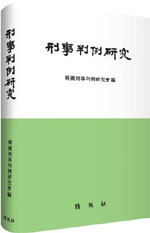고소인이 간통죄의 제1심 판결 선고 후 피고소인과 다시 혼인한 경우 등과 간통고소의 효력
- 한국형사판례연구회
- 형사판례연구
- 형사판례연구 제19권
-
2011.06138 - 175 (38 pages)
- 8

The aim of this paper is to examine the Supreme Court Decision 2009Do7681 decided December 10. The victimized spouse A accused 甲 and 乙 of adultery and in court, the spouse 甲 admitted that she committed adultery with 乙. They were sentenced to six months in prison with a stay of execution for one year but only she appealed the decision to a higher court. After sentence of the first instance, she was reunited with her former husband(the accuser A). But the appellate court dismissed her appeal. However, the Supreme Court decided that, if the accuser and the accused(spouse) of adultery reunite after sentence of the first instance, the complaint of adultery do not meet the valid requirements named ‘the dissolution of matrimonial relationship’, therefore, the court shall dismiss the public prosecution according to Paragraph 2(Where the procedure for instituting public prosecution is void by reason of its having been contrary to the provisions of Acts) of Article 327 of the Criminal Procedure Act. Nevertheless, the court below did not follow legal principles above, and the court dismissed the appeal. Therefore, the judgement of the court below shall be reversed for error in law regarding prosecution requirements, and the Supreme Court may render a direct judgment on the case according to Paragraph 1 of Article 396 of the Criminal Procedure Act. This Supreme Court ruling follows the precedent set by the Supreme Court Decision 75Do1449 decided June 24. The summary decision of this decision was as follows. When the divorce action is withdrawn or the accuser reunite with the accused again, the court shall dismiss the public prosecution according to Paragraph 2 of Article 327 of the Criminal Procedure Act. In adultery case, not only should a complaint be fulfilled from instituting public prosecution to terminating a criminal trial, but also the other valid prosecution requirements named ‘the dissolution of matrimonial relationship’ or ‘the pendency of a divorce action’ should be fulfilled from instituting public prosecution to terminating a criminal trial. It is covered in Paragraph 1, 2 of Article 229 of the Criminal Procedure Act. In cases where the divorce action is withdrawn or the accuser reunite with the accused again after sentence of the first instance, the Supreme Court don’t treat the withdrawal of the divorce action and the reunion as a withdrawal of a complaint. So, if the divorce action is withdrawn or the accuser reunite with the accused again after the sentence of the first instance, the public prosecution do not meet the valid requirements for prosecution of Paragraph 1 of Article 229 regardless of Paragraph 2 of Article 229 of the Criminal Procedure Act, and the procedure for instituting public prosecution is void by reason of its having been contrary to the provisions of Acts. Therefore the court shall dismiss the public prosecution according to Paragraph 2 of Article 327, not of Paragraph 5 of Article 327 of the Criminal Procedure Act. In conclusion, I am in favor of the Supreme Court opinion because the court’s decision do not hinder the accuser and the accused’s plan to reunite with and recover a domestic peace after a sentence of the first instance. This decision would be considered an important test case by both advocates and opponents of adultery.
Ⅰ. 事案의 槪要
Ⅱ. 소송의 진행 경과
Ⅲ. 評釋
Ⅳ. 結論
(0)
(0)